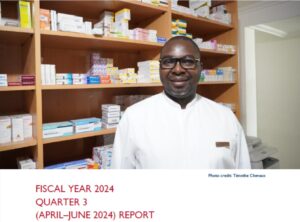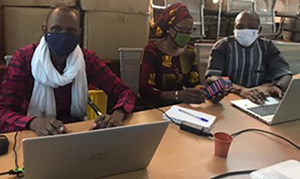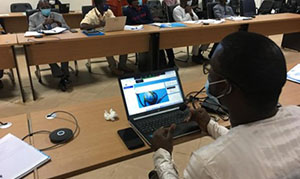MTaPS Support
USAID MTaPS is supporting Mali in strengthening its pharmaceutical system by addressing a variety of public health challenges. In particular, MTaPS is helping Mali enhance its Joint External Evaluation capacities in infection prevention and control (IPC) and antimicrobial stewardship (AMS) under the country’s Global Health Security Agenda (GHSA) mandate. Additionally, the program leveraged its IPC expertise to assist Mali in combating the COVID-19 pandemic and in preparing for a potential Ebola Virus Disease epidemic. At the same time, MTaPS provided technical assistance to optimize and secure Mali’s supply of drugs related to maternal, newborn, and child health.
Program Objectives
Global Health Security Agenda
- Support the efforts of the Mali government and other stakeholders to lay a foundation for establishing a national IPC program, from central to peripheral levels.
- Provide technical assistance on AMS by helping the country develop a national AMS plan and guidelines and strengthen regulatory bodies in health facilities, with the ultimate goal of optimizing the use of medicines.
Pandemic and Epidemic Support
- Built the capacity of health professionals to handle the influx of COVID-19 patients and to master IPC practices, including the proper use of personal protective equipment (PPE).
- Provided financial and technical support for efforts related to supply chain, waste management logistics, and pharmacovigilance to ensure a successful COVID-19 immunization program.
Maternal, Newborn, and Child Health
- Support Mali’s Directorate of Pharmacy and Medicine in building health workers’ capacity with respect to the drug certification process in Mali.
- Support the Directorate of Pharmacy and Medicine in building health workers’ capacities on rational medicine use.
Key Achievements
- Facilitated the revision of the AMR National Action Plan and the IPC National Strategic Plan (NSP), by fostering collaboration among stakeholders representing four key One Health sectors (animal health, human health, environment, and agriculture) and the World Health Organization (WHO). The revised IPC NSP was adopted by the Ministry of Health.
- Supported the National Multisectoral AMR Coordination Group in developing Mali’s first-ever IPC toolkit along with partners such as WHO, the United Nations Children’s Fund (UNICEF), and IntraHealth. The toolkit includes the revised national IPC guidelines, a facilitator’s guide, a participant’s manual, and work tools.
- Supported IPC-practices monitoring in 16 health facilities using the standard IPC Assessment Framework (IPCAF) tool, helping 38% of those facilities reach an advanced level in 2022 (compared to a 2020 baseline assessment of 6%).
- Provided facilities with the technical assistance they needed to establish drug and therapeutics committees, helping them develop terms of reference and training modules for members. Build the capacities of facilitators and master trainers on the AWaRe classification—WHO’s “access, watch, reserve” categorization of antimicrobials aimed at guiding their appropriate use—as well as the functioning of the committees.
- Supported the development of a national AMS plan, in conjunction with multiple stakeholders from the animal- and human-health sectors.
- Supported the launch of an e-learning platform focusing on current national guidelines on health care-associated infection prevention and on best international clinical practices for preventing and managing infections caused by multidrug-resistant bacteria.
- Worked on significantly reducing the time it takes to develop the drug nomenclature from several months to a few hours by repairing Pro-E-Med—the software Mali uses to collect data on medicines approval—and training health staff involved in the drug supply chain on how to use the national drug nomenclature.
- Supported the implementation of a national action plan for COVID-19 that focused on IPC program management, defined the country’s strategy to combat COVID-19, and built the IPC capacities of health care workers and ancillary staff.
- Developed pharmacovigilance training modules for COVID-19 vaccine-related adverse events following immunization (AEFI), which focused on preventing and investigating AEFI as well as communicating with, and caring for patients with AEFI.
- Helped more than 70% of the reference health centers on the front line against the Ebola Virus Disease move from an intermediate level to an advanced level on the WHO IPC scorecard. This was achieved by using a strategy that provided Ebola prevention and control training and developing actions to address the characteristics of EVD, such as protocols for PPE use, biowaste management, injection security, safe and respectful burials, and disinfection of environments, clothes, and health care equipment.




